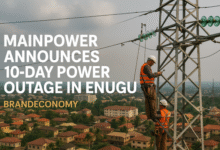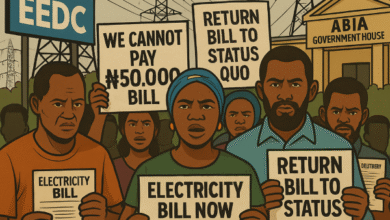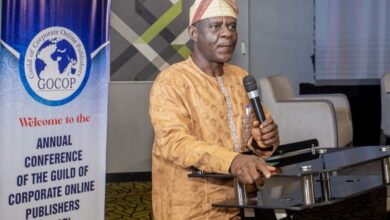Why NLNG Won Best Corporate Training Partner 2025

Nigeria LNG Limited (NLNG) has been honoured as the Best Corporate Training Partner 2025 at the Oil and Gas Trainers Association of Nigeria’s (OGTAN) Human Capital Development Awards. Beyond a trophy, the win validates decades of deliberate investment in skills, workforce localization, and technical partnerships that continue to shape Nigeria’s oil and gas industry.
A Defining Moment in Lagos
At the 4th edition of the OGTAN Human Capital Development Awards in Lagos, NLNG was crowned Best Corporate Training Partner 2025. The recognition wasn’t a surprise—it was the outcome of decades of steady, measurable commitment to building skills, local capacity, and industry-ready professionals in one of Nigeria’s most strategic sectors.
Announcing the award, OGTAN praised NLNG’s track record of training investments, technical partnerships, and CSR-driven education initiatives, noting that the company has “distinguished itself as a true partner in capacity building.”
Receiving the award on behalf of the company, Emmanuel Uleh, Head, Nigerian Content Compliance Assurance & Monitor, reiterated NLNG’s philosophy:
“At inception, NLNG deliberately promoted local capacity development by training Nigerian technicians and operators for the operation and maintenance of its plant on Bonny Island. Today, this strategy has yielded remarkable results: NLNG boasts a 100% Nigerian management team and a workforce that is over 95% Nigerian.”
Sector-by-Sector Analysis: The NLNG Approach
1. Workforce Localization: From Expatriate Reliance to Nigerian Leadership
When NLNG began operations in Bonny Island, it faced a major challenge: limited local expertise in complex LNG operations. Instead of defaulting to perpetual expatriate dependency, the company deliberately invested in Nigerians.
- Result: Today, all NLNG management roles are held by Nigerians.
- Workforce composition: Over 95% Nigerian staff.
Investor Implication: Localization ensures lower operating costs, stronger license-to-operate, and deeper community goodwill—all vital for sustainable profitability.
2. Technical Training & Global Exposure
Through the Bonny Gas Transport Plus Project, NLNG trained over 600 Nigerians in highly technical fields—ranging from naval architecture and shipbuilding to advanced welding and fabrication. Training locations included Nigeria and South Korea, embedding local staff in international best practices.
Investor Implication: Building globally benchmarked Nigerian engineers and operators reduces foreign exchange leakage and strengthens Nigeria’s position in LNG shipping and vessel management.
3. Partnerships with Regulators and Industry Trainers
NLNG collaborates with the Nigerian Content Development and Monitoring Board (NCDMB) and OGTAN itself to deliver certified training programmes. So far, more than 150 people have been trained through NLNG’s asset projects.
Investor Implication: Partnerships lower duplication costs and ensure training remains aligned with national policy, mitigating regulatory risks and deepening NLNG’s strategic alliances.
4. Train 7 Human Capital Development Agenda
The ongoing Train 7 Project, a multi-billion-dollar expansion of NLNG’s capacity, has embedded a significant human capital development programme.
- 400+ Nigerians currently in training.
- 140+ trainees embedded in plant maintenance.
- 200+ community youths undergoing vocational and technical skills programmes.
Investor Implication: Train 7’s workforce development ensures Nigeria doesn’t just expand LNG capacity—it builds a pipeline of local talent for long-term operations.
5. Education & CSR Beyond the Industry
NLNG’s capacity-building extends into the wider Nigerian education ecosystem:
- Sponsorship of STEM programmes.
- University endowments and scholarships.
- Support for technical colleges and vocational centres.
Investor Implication: By investing in education pipelines, NLNG is future-proofing workforce availability while enhancing its CSR reputation, vital in ESG-driven global capital markets.
Strategic Context: Why Human Capital Matters in Oil & Gas
The oil and gas sector is undergoing a generational shift. With energy transition pressures, digital transformation, and stricter ESG compliance, the companies that thrive will be those who embed skills and local content into their DNA.
NLNG’s recognition is not just symbolic—it positions the company as:
- A model operator in Nigeria’s push for local content.
- A benchmark for global peers in emerging markets.
- A talent exporter capable of competing with international LNG hubs.
BRANDECONOMY Takeaways for Decision-Makers
- Human capital is ROI, not charity. NLNG’s win proves that capacity building directly strengthens profitability, compliance, and resilience.
- Localisation drives stability. By achieving 95% Nigerian workforce and 100% Nigerian management, NLNG reduced reliance on expatriates while building national pride.
- Partnerships amplify impact. Collaboration with OGTAN, NCDMB, and global training institutes multiplies results and aligns with policy.
- Expansion must embed training. The Train 7 model—tying infrastructure growth to human capital—is the template for future industrial projects.
- ESG edge. In a world where ESG scores shape financing, NLNG’s human capital investments give it a competitive advantage in raising capital and securing international trust.
Investor Implications
- Upstream & Midstream Players: Firms should mirror NLNG by embedding training in expansion projects to reduce long-term operating costs.
- Government: Policies must reward firms that demonstrate measurable impact in skills transfer.
- Banks & Capital Markets: Capacity development should be factored into credit ratings and loan terms, incentivising sustainable operators.
- Communities: Vocational training pipelines reduce unemployment and build stronger community-company relations, lowering social risk.
The Bigger Picture
Nigeria’s ambition to become a $1 trillion economy under the Renewed Hope Agenda will hinge heavily on human capital. Without skilled engineers, technicians, and managers, no infrastructure investment will yield sustainable dividends.
NLNG’s recognition is thus more than an industry award—it is a signal to policymakers, investors, and corporates that skills are the new oil.











